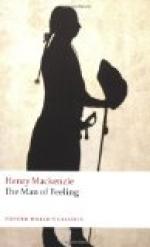Harley saw this; for though he was a child in the drama of the world, yet was it not altogether owing to a want of knowledge on his part; on the contrary, the most delicate consciousness of propriety often kindled that blush which marred the performance of it: this raised his esteem something above what the most sanguine descriptions of her goodness had been able to do; for certain it is, that notwithstanding the laboured definitions which very wise men have given us of the inherent beauty of virtue, we are always inclined to think her handsomest when she condescends to smile upon ourselves.
It would be trite to observe the easy gradation from esteem to love: in the bosom of Harley there scarce needed a transition; for there were certain seasons when his ideas were flushed to a degree much above their common complexion. In times not credulous of inspiration, we should account for this from some natural cause; but we do not mean to account for it at all; it were sufficient to describe its effects; but they were sometimes so ludicrous, as might derogate from the dignity of the sensations which produced them to describe. They were treated indeed as such by most of Harley’s sober friends, who often laughed very heartily at the awkward blunders of the real Harley, when the different faculties, which should have prevented them, were entirely occupied by the ideal. In some of these paroxysms of fancy, Miss Walton did not fail to be introduced; and the picture which had been drawn amidst the surrounding objects of unnoticed levity was now singled out to be viewed through the medium of romantic imagination: it was improved of course, and esteem was a word inexpressive of the feelings which it excited.
CHAPTER XIV—HE SETS OUT ON HIS JOURNEY—THE BEGGAR AND HIS DOG
He had taken leave of his aunt on the eve of his intended departure; but the good lady’s affection for her nephew interrupted her sleep, and early as it was next morning when Harley came downstairs to set out, he found her in the parlour with a tear on her cheek, and her caudle-cup in her hand. She knew enough of physic to prescribe against going abroad of a morning with an empty stomach. She gave her blessing with the draught; her instructions she had delivered the night before. They consisted mostly of negatives, for London, in her idea, was so replete with temptations that it needed the whole armour of her friendly cautions to repel their attacks.
Peter stood at the door. We have mentioned this faithful fellow formerly: Harley’s father had taken him up an orphan, and saved him from being cast on the parish; and he had ever since remained in the service of him and of his son. Harley shook him by the hand as he passed, smiling, as if he had said, “I will not weep.” He sprung hastily into the chaise that waited for him; Peter folded up the step. “My dear master,” said he, shaking the solitary lock that hung on either side of his head, “I have been told as how London is a sad place.” He was choked with the thought, and his benediction could not be heard: —but it shall be heard, honest Peter! where these tears will add to its energy.




